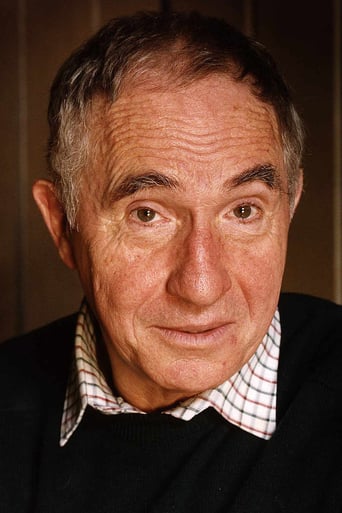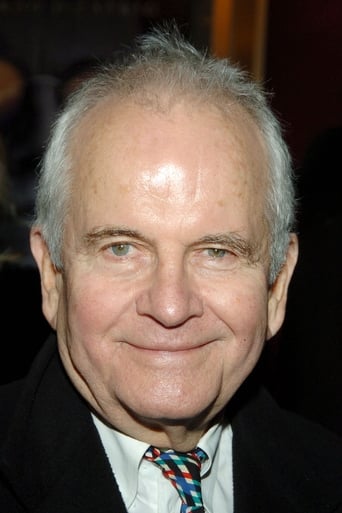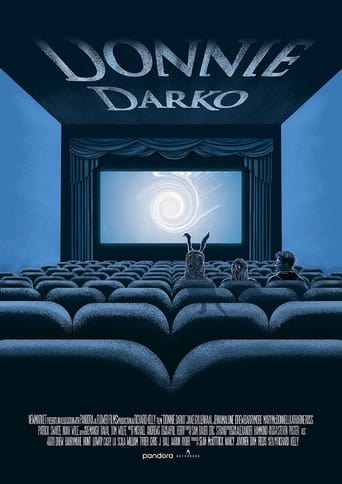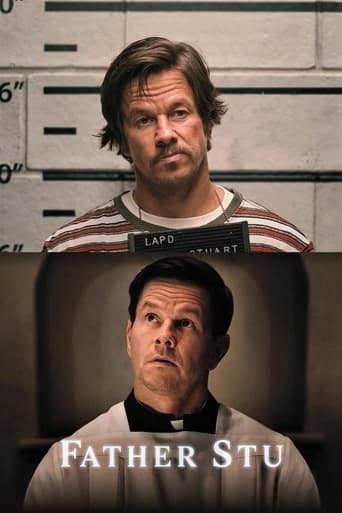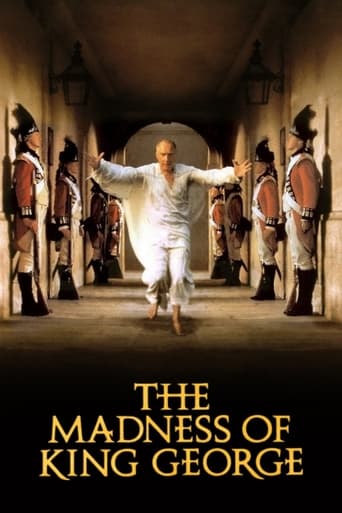
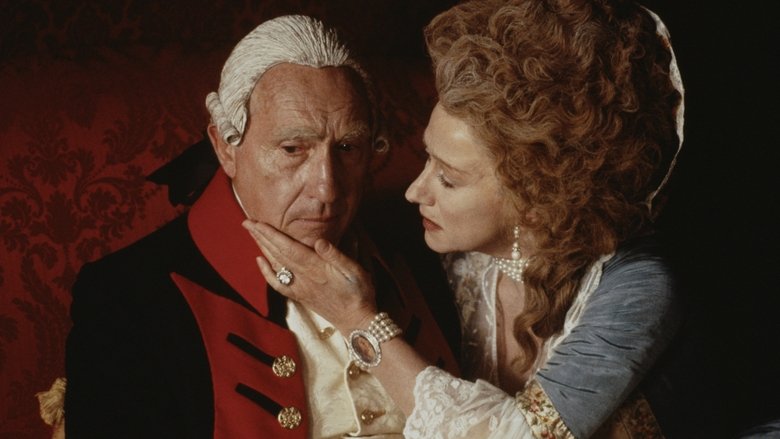
The Madness of King George (1994)
 Watch Now
Watch Now









Aging King George III of England is exhibiting signs of madness, a problem little understood in 1788. As the monarch alternates between bouts of confusion and near-violent outbursts of temper, his hapless doctors attempt the ineffectual cures of the day. Meanwhile, Queen Charlotte and Prime Minister William Pitt the Younger attempt to prevent the king's political enemies, led by the Prince of Wales, from usurping the throne.
Watch Trailer
Cast


Similar titles
Reviews
Sorry, this movie sucks
If the ambition is to provide two hours of instantly forgettable, popcorn-munching escapism, it succeeds.
By the time the dramatic fireworks start popping off, each one feels earned.
Exactly the movie you think it is, but not the movie you want it to be.
As an under-educated American, I was totally unaware of the Regency crisis of 1788, or for that matter any information about the health of the tyrant George III. (Although to be sure, he fell far short of modern tyrants, the Stalins, Husseins, and Pots of the world.) And since I do not get my history from feature films, it may not be true. (Take that, Oliver Stone) There was a lot of nice acting in this historical drama however, particularly from the inimitable Nigel Hawthorne. Would that Helen Mirren had a larger part, as she is always superb. One of the things that most struck me was how everyone of that period, even royalty was held hostage to the ignorance and barbarism of medieval medicine. I wonder what people will think of current medicine two hundred years hence.
This movie was something I wanted to see when it came out in 1994 and I was only nine years old, so of course Mom didn't allow it. I remembered the movie tonight and got a hold of it. I think that had I watched the movie that young, ratings aside, I would probably have appreciated Rupert Graves' handsomeness more than the tale the movie was trying to tell me, so I'm glad I waited. The movie was horribly slow-paced at times. It could have used a rewrite and a tightening up of the script. However, the acting from everyone was wonderful and anyone else playing King George III might not have saved the movie from its script. I also felt moved by the predicament of having a nervous system condition that IMDb claims I'm misspelling when I'm not misspelling it in an age where modern medicine thinks that giving you boils will cure something and modern psychiatry is locking people (some of who aren't actually legitimately mentally ill) in an asylum. If you're looking for something that is somewhat thought provoking, has wonderful acting, and is set during the Regency, this would be a movie to consider. On that note, if you do not have patience for a slow script, occasional too much dumped on you at once before meandering again, then reconsider.
I saw this when it first came out, very much enjoyed it but my memory of it had grown foggy so, when it was shown tonight at my public library, I made a point of seeing it again. Good choice and I see why I remembered it as being so good.Hawthorne as the king, Mirren as the queen, Holmes as the doctor are all superb with Hawthorne the star shining brightest. The view of court life, loyalties, disloyalties, hidden agendas, was excellent.For those wishing more background of the era, I commend to you the viewer's comment of theowinthrop's (21 May 2005), "The King Who Talked to Trees..." which concisely summarizes the history of the era; this film is more loyal to the facts than most historical films. Most people seeing this will miss its delineation of the "Moral Treatment" movement in mental health. I'm a retired clinical psychologist and my internship was in the late '50s when psychotropic medicines were just coming in. The techniques of Dr. Willis were consistent with those of the "moral treatment" movement. These were later used at Topeka State Hospital, KS, (and a few others -- in the USA they originated at Pensylvannia Hospital with Dr. Benjamin Rush). This was "state of the art" during a few decades of the late 1800s but it began in Europe more than a century earlier. MT had many variants but generally demanded hard work, appropriate behavior, rewards and consequences, etc., and while its effectiveness was not equal to those of good treatment facilities in the 21st century, it was FAR better than other alternatives of that period -- and of many later periods through the 1940s. While many mental disorders (schizophrenia, bipolar disorders, etc., and the porphyria of King George) have a biological basis, the symptoms can be somewhat ameliorated, sometimes controlled by psychological forces. I found this account completely believable on a temporary basis. For a history of the MT techniques, please Google "Moral treatment" asylums; the Wikipedia article is quite good.This film is listed as a comedy. I view it as a drama with tragic and comedic overtones. I've worked enough years with psychotic patients in hospitals and in private practice that the loss of control of one's mind and its impact on one's family and associates never strikes me as comical. It's not that funny things don't happen -- as sometimes they did in this film -- but that's certainly not the overall arch. This film ends on an apparent upnote, at a point when the king was seemingly restored to his mind but before a later recurrence from which he did not recover.(As an example of briefly "funny" happenings in a tragic life, there was my episode with "Julian", a schizophrenic in his 20s who was in my therapy group. One day he didn't show up and I found he'd been placed in seclusion for groping an attractive (female) nurse. I visited him while he was in seclusion to continue our therapy relationship. When I questioned Julian why the groping had happened, he explained, "Aw, Doc, what's the use of being schizophrenic if you can't get some kicks out of it?" Somewhat funny, yes, right after the moment, but the overall arch of his brief life was closer to the tragic.)
This film is based on a totally frivolous but delightful stage romp which depicted the political machinations in London in the late eighteenth century when King George III first showed signs of mental instability. The ruling Tory government did not want to see him replaced by his son acting, in accordance with the constitution, as Regent (i.e. as King in everything but name) because the Prince tended to be a political supporter of the opposition Whigs. Conversely the Whig leaders recognised that if they could force through a Regency Bill to effect this replacement, the grateful Prince should give them a great deal of support. They made every effort to draw attention to the king's problems and simultaneously introduced the Regency Bill into Parliament. The Tories countered by stalling tactics on this bill combined with attempts to bring the King into public view at times when he would do nothing to suggest possible mental instability; and later with drastic attempts to provide medical support to correct or minimise the King's problem. Little was understood medically about insanity at this time but history shows that the very unconventional treatments devised by the appointed Court Physician finally proved successful, and the King recovered for quite a long period, although his insanity eventually returned to become clearly evident to all, so that his son did finally become Prince Regent for the last nine years of his father's life. The play, and this film on which it is based, portray events during the Kings earlier period of mental instability from which records show that he appeared to make a fairly complete recovery. The comedy lies mainly in the re-creation of the political manoeuvring of the period, and the way in which this was accepted by London Society, although many sequences showing courtiers and other attendants relaxing after the king left a room were also very amusing.. This may not sound a great deal, but I found it made a most satisfying film. There were also moments of real pathos and drama which showed the Queen (played by the superlative actress Helen Mirren) supporting her husband in every way she could, and I for one became sufficiently involved in the story to experience real pleasure when the king won his struggle and resumed his normal duties. The film itself is inconsequential, but, if comedies of manners and situations appeal to you, you should not miss any chance to see it.The comedy is not limited to the actual film but extends also to its title. It has been reported that the Studio planned to release this film under the title "The Madness of King George III"; but at the last minute they were advised that this title might drastically reduce the audiences in the United States where viewers who had not seen "The Madness of King George I" or "The Madness of King George II" would probably decide to give it a miss, and it was therefore decided not to identify which British monarch was the subject matter for this delightful romp.Nigel Hawthorne starred as the King and Rupert Everitt played the Prince of Wales. Dr Willis, the unconventional physician who had such an important role in the events, was beautifully played by Ian Holm. This film avoided the common trap of transcribing a stage play to film so literally that many of the sequences become unduly lengthy and much too static. The original play by Allan Bennett was very successful in England and he was fortunately (but unusually) asked to prepare the film script from it himself. On the basis of this example I would recommend that the authors of most plays intended as the basis for a film should be given the opportunity to have a much greater say in the preparation of the film-script. The several awards won by this film were all well deserved, but it remains dominated by the superlative performance of Nigel Hawthorne. (This was also the general verdict on the original London stage production and it will be a brave theatre manager who brings the play back there with a different lead actor.)


